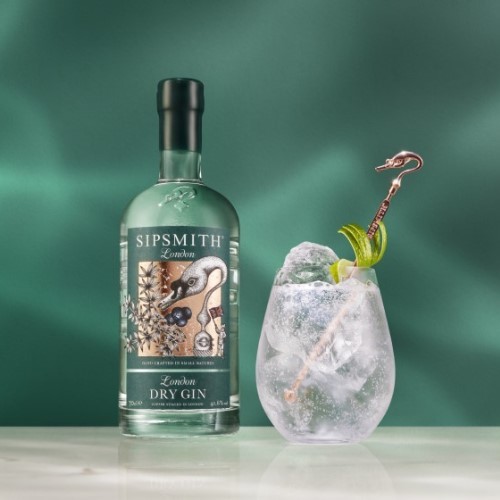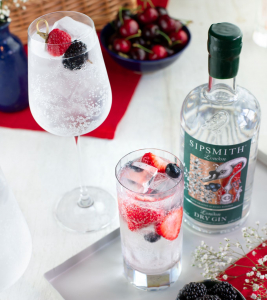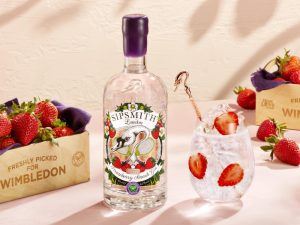The English staple is utter perfection when done right. And yet, it seems that no two bartenders or sippers can agree on how to make the perfect G&T. Here’s how to master this classic two-ingredient gin cocktail – the Sipsmith way.
Apart from the heavily contested Martini, few gin cocktail recipes are as simple but as fought-over as the gin and tonic. How much ice should you use? What’s the best gin-to-tonic ratio? For a garnish, is lemon or lime better? Which glass is best to serve it in?
Though these may seem like petty quibbles, they’re of no small importance – the gin and tonic done well is nothing short of alchemic perfection. We’ll share our favourite recipe below, as well as a few inventive variations, but first we’re tackling some of the more stubborn issues surrounding the classic drink.
By now we’re well familiar with the history of the gin and tonic: first a product of necessity, the G&T made bitter and quinine-rich tonic water (and its anti-malarial effects) palatable with the addition of gin, ice, and citrus. Despite its initial medicinal use, the G&T has since become a favourite of drinkers around the globe, prized for its freshness and subtle complexity.
GETTING THE DETAILS RIGHT
By now we’re all familiar with the history of the gin and tonic: first a product of necessity, the G&T made bitter and quinine-rich tonic water (and its anti-malarial effects) palatable with the addition of gin, ice and citrus. Despite its initial medicinal use, the G&T has since become a favourite of drinkers around the globe and is prized for its freshness and subtle complexity.
It’s no wonder that, given its international popularity, the G&T has a number of different guises. When it comes to the eternal question of lemon versus lime, there are a few different takes on the matter. Those who argue for lime say the fruit, with its bright, punchy flavour, offers a boldness that lemon simply can’t match. However, many purists argue that lemon is the only choice: as a more delicate fruit, it is less likely to overwhelm the bounty of a gin’s botanicals.

LEMON VS LIME GARNISH
It’s no wonder that, given its international popularity, the G&T has a number of different guises. When it comes to the eternal question of lemon versus lime, there are a few different takes on the matter. Those who argue for lime say the fruit, with its bright, punchy flavour, offers a boldness that lemon simply can’t match. However, many purists argue that lemon is the only choice: as a more delicate fruit, it is less likely to overwhelm the bounty of a gin’s botanicals.
ADVICE FROM THE COCKTAIL-MAKING EXPERTS
Max Venning from the award-winning Three Sheets cocktail bar in London advises you use a light hand: “There’s no need to squeeze the citrus over the drink. If you’re using a quality gin like Sipsmith, there’s no harshness that needs covering up.”
Other experts move beyond citrus to embrace a range of alternative ingredients. Julia Forte from the London Gin Club says: “Match your garnish to the specific or highlighting botanicals in the gin. Lime, rhubarb or an olive work well with dry gins, while grapefruit, citrus peel, cucumber and rose petals work with floral gins. For a savoury gin, try rosemary, thyme or basil with a cherry tomato.”

High-quality ice is also essential: the frostier the G&T, the better. To help with this, glasses should be chilled in the freezer before use. When making your perfect G&T, ice should be rock-hard and absolutely frozen, and packed all the way up to the brim – that ensures that it will melt more slowly. Declan McGurk from the American Bar at the Savoy Hotel also cautions: “The type of ice is critical – it needs to be good quality to avoid bad-tasting dilution.”
Even glass shape is a sticking point: though a highball is the conventional choice, gin and tonics are delicious when served in stemless wine glass – that’s because of its delicate botanicals, which mean gin does best when provided with some good swirling space.
RECIPE: THE PERFECT G&T
- 50ml Sipsmith London Dry Gin
- 150ml good quality tonic water, we use Fever-Tree Indian Tonic
Fill a thin-rimmed highball glass up to the top with ice cubes (a pre-chilled glass is even more ideal) and pour in gin. Top with tonic water and garnish with a wedge of fresh lime. Using a stirrer or long spoon, lift the liquid from the bottom to gently combine the gin without reducing the fizz.
VARIATIONS ON A CLASSIC
The Classic Gin & Tonic might be a drink of satisfying simplicity, but there are plenty of opportunities to add your own signature style.
You can discover your perfect serve by answering a few simple questions that reveal if you’re a Classic, Zesty or Champion sipper. In turn, this will help you identify your ideal Sipsmith sip – whether that’s a London Dry G&T, Zesty Orange G&T, Lemon Drizzle G&T or Strawberry Smash G&T.
And, for an extra twist of juniper – that superstar botanical of any traditional-style gin – stir up a V.J.O.P G&T. This flavour-packed cocktail is made with our Very Junipery Over Proof Gin, a navy-strength gin that undergoes a three-part juniper-infusion process, including a three-day maceration.

Don’t forget to take a photo of your perfect G&T and tag us @sipsmith – we’d love to see your classic and contemporary creations on social media.
